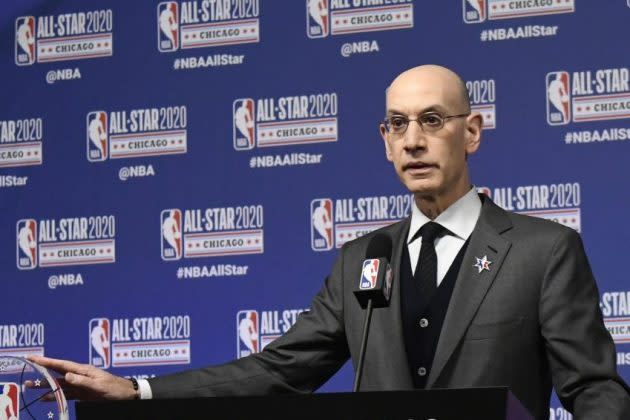Adam Silver Paints Rumored $2.5 Billion NBA Expansion Fee as ‘Very Low’

Back in late December, NBA commissioner Adam Silver acknowledged financial losses resulting from the coronavirus pandemic had led the league to consider the possibility of market expansion. It has since been reported the NBA discussed adding two teams—both of which would come with a $2.5 billion expansion fee that would be distributed among the league’s current group of governors.
Silver participated in Sportico’s NBA valuations event on Tuesday. The commissioner was “not ready” to confirm the number of teams or the price point the league would seek if it were to add clubs. He said it “doesn’t feel like the right time” to focus resources or attention on future growth with the league still trying to navigate the pandemic. But Silver did say that “clearly [the] valuations [show] some of the reported numbers [for expansion fees] are very low in terms of the value at which we would expand.”
Our Take: It was surprising to hear Silver suggest $2.5 billion would not be enough to bring a team to Seattle, Las Vegas, Kansas City, Mexico City or any other rumored expansion market. $2.5 billion sounds like an astronomically high price—particularly when one considers no North American pro sports team has ever sold for more than $2.35 billion (see: Joe Tsai, Brooklyn Nets). Sportico valuations authority Peter Schwartz agreed noting that $2.5 billion is greater than the average NBA team valuation. “That’s not in accordance with pricing on past expansion fees paid in sports—with the slight exception of Seattle in the NHL.”
Schwartz isn’t the only one we spoke to who doubted the league could command $5 billion in expansion fees for a pair of new teams. A sports banker, who asked to remain anonymous to speak openly, said, “If no one is pitching Glen Taylor within a billion dollars of $2.5 billion for Minnesota, why would you think someone would spend $2.5 billion to go to Las Vegas? It’s not a better market.” Remember, in Las Vegas the owner would either have to share stadium revenues with the Golden Knights or build his/her own venue. The banker also noted it is not as if there are “a lot of people who can write a $2.5 billion check”—a problem the NFL has come to realize.
$2.5 billion may not be realistic, but Don Cornwell (partner, PJT Partners) said he wasn’t surprised to hear Silver suggest expansion clubs aren’t going to go for any less. “Because you are effectively [getting] the opportunity to buy about a 3% stake in the NBA,” he said. “That shouldn’t be a low number. That should be a very high number.”
While the addition of new clubs wouldn’t appear to be in NBA’s immediate future (sorry, Sonics fans), the commissioner did say it’s “inevitable that at some point [the league] will turn back to expansion. Successful organizations tend to grow over time.” But with team valuations on the rise, he insists the decision to add teams isn’t as obvious as some may think. “At the end of the day, we’re selling equity in our league. And if you’re selling equity, part of the calculation needs to be, what will 1/31st, 1/32nd be worth in the future?”
Washington Wizards owner Ted Leonsis told Sportico’s Eben Novy-Williams and Peter Schwartz during Tuesday’s event that down the line, NBA teams should be worth significantly more money than they are today. “When you look at how big the [potential] marketplace is, [the NBA is] still a small business,” Leonsis said. “When you think about [there being] 8 billion people around the world, 6 billion now connected with high-speed connections [there are many potential fans out there]. Our cable ratings—even though we’re pretty much the top rated show up and down the line nightly—are still small” from a penetration standpoint. The league, he said, still has “a lot of upside.”
If Leonsis is right, then it’s fair to wonder if the NBA should expand further. “MLS takes the money because they need it,” the sports banker said. “Their teams are losing so much money. But the NBA—in a non-COVID year—is basking in money. If the owners feel the sky is the limit (as several suggested during Tuesday’s event), why would they bring in another team at today’s valuations? They wouldn’t, because the dilution is punitive.”
For the record, Silver does not believe the NBA should expand in an effort to recover lost revenues. “The main driver for expansion should be the ability to grow the pie,” he said, and “not necessarily to sell equity to bring in cash now as opposed to generating the money later.”
Schwartz disagreed that dilution would dissuade owners from expanding. He said concerns about dilution have existed since pro sports leagues first expanded and “team owners have always gone back to the well. And while maybe, over time, the amount of shared revenue lost adds up to a point where it’s not beneficial. But most owners don’t look at it that way. They look at [expansion] as getting a cash infusion [up front] and [see] the positives of expansion (like moving into new markets) rather than the negatives—especially if they’re able to get the types of prices Adam Silver mentioned.”
More from Sportico.com
